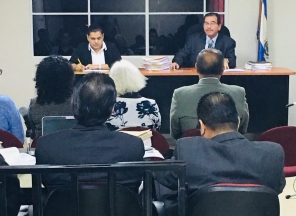
Last week brought a very important step forward in the decades-long fight for justice for human rights violations committed during El Salvador’s civil war. A court in that country has recognized that the events of the El Mozote massacre (1981) constitute war crimes and crimes against humanity, allowing the defendants to be tried for these charges, in addition to the nine crimes they have already been charged with under national law, among them aggravated rape and murder. In so ruling, Judge Jorge Alberto Guzmán Urquilla took into account that the nearly 1,000 victims were civilians who were systematically executed as part of a larger plan of extermination. Importantly, the judge ruled that applying these charges does not violate the principle of legality because they were already crimes at the time of the massacre under the applicable international and customary law. This is the first ruling of its kind in a Salvadoran tribunal, and is in line with a 2012 Inter-American Court of Human Rights judgment holding that the events of the massacre were grave human rights violations qualifying as international crimes.
DPLF has accompanied and supported the El Mozote case in many ways. In collaboration with the Human Rights Institute of the José Simeón Cañas Central American University (IDHUCA), we presented an amicus brief in favor of applying the charges of war crimes and crimes against humanity to this case. The court agreed with our argument that the “double charge” under both domestic and international law has an important symbolic effect as it reflects the gravity of the crimes and the importance of the massacre as an offense against all humankind. Indeed, Judge Guzmán Urquilla noted in his ruling that applying only the criminal law of 1973 would fail to account for the wide-scale, systematic nature of the atrocities that exceeded any reasonable or justifiable military operation.
Judge Guzmán Urquilla also accepted and swore in expert witnesses proposed by the victims’ lawyers (the private prosecutors in the case): Clever Alberto Pino, a Peruvian Colonel who will testify regarding the command structure of the military, and Terry Karl, former staff member of the US Congress during the time of the Salvadoran civil war and currently a professor at Stanford University who will testify about declassified documents. The expert witnesses proposed by the Attorney General’s Office - Joanna Marroquín and Astrid Francia, social anthropologists with the Ministry of Culture of El Salvador - were also accepted by the court. The acceptance of Professor Karl was of particular legal significance as her testimony will be in relation the El Mozote massacre as part of a pattern of wider atrocities committed against the civilian population during the war, which in turn is relevant to the application of the figures of war crimes and crimes against humanity.
Judge Guzmán Urquilla did not accept four of the proposed defense expert witnesses. One was rejected based on lack of specific information provided about his expertise. The judge found that another three failed to meet the criteria of impartial and objective witnesses, as two of the proposed individuals - General Otto Alejandro Romero Orellana and General Humberto Corado Figueroa -had served in the military during the armed conflict alongside some of the accused, including the former Defense Minister, General José Guillermo García and former Military Chief of Staff General Rafael Flores Lima. Another had previously acted as legal representative for two of the defendants. The judge affirmed the statement of the victims’ representative María Dorila Márquez de Márquez, who explained: “we do not agree with the proposed defense witnesses because they are supporters of the same military officers who seek to cover up the massacre of which we are survivors.”
The judge’s rulings on the expert witnesses and the applicability of international crimes constitute unprecedented developments that will hopefully lay the groundwork for justice to finally be served in the El Mozote massacre case, and for other human rights cases regarding El Salvador’s armed conflict.





